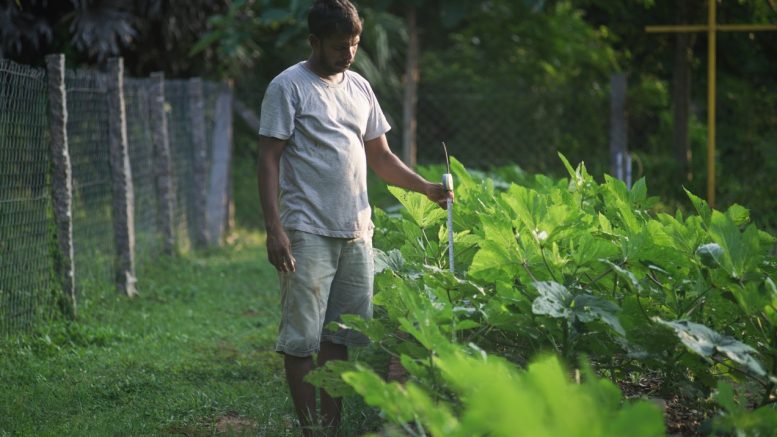A cloud-based, micro-irrigation system tested on a farm in India has cut water use by up to 80 percent and doubled the crop yield, and could relieve the environmental stress that agriculture places on India’s natural resources.
The system, which was developed by scientists at Heriot-Watt University in Edinburgh, combines a highly localised weather forecast with local know-how on irrigation needs and soil conditions and has been trialled as part of the Innovate UK-funded Smart Control of Rural Renewable Energy and Storage (SCORRES) project.
Reducing water consumption and improving irrigation techniques in India is vital: currently, 600 million people are at high risk of surface water supply disruption. Agriculture accounts for 90 percent of India’s freshwater withdrawal, 18 percent of total electricity and 15 percent of total diesel use. Fifty four percent of India faces extremely high water stress, and farmers are increasingly indebted due to the volatility of crop yields and prices.
At the trial farm in Tamil Nadu, eight vegetable crops have been farmed using the SCORRES precision irrigation system: lady’s fingers, lettuce, basil,basella, pumpkin, corn, rocket and long beans.
Local farmers’ knowledge on irrigation and soil conditions for each of these crops are scheduled onto the cloud-based system.
SCORRES refines the irrigation schedule by using its highly accurate local weather forecast, soil moisture conditions, evaporation modelling and grid outage information to continually adapt the schedule and ensure the crops receive exactly the right volume of water, at the exact time that they need it.
Professor Eddie Owens, director of Heriot-Watt University’s Energy Academy and leader of the SCORRES project, said: “We tested eight crops with our precision irrigation system, and had control beds that were manually irrigated. The results of our initial trials were extremely encouraging
“Our irrigation system reduced water and energy use by up to 80%, and in some of the trials the crop yield doubled, enabling farmers to grow bigger vegetables and fruits, faster.
“These results are extremely encouraging and have the potential to create a more resource efficient and sustainable future for the global agriculturalsector. A next step will be to expand our trial across India and into China.”
Martin Scherfler from Auroville Consulting, a SCORRES partner, oversaw the installation of the irrigation system and has been monitoring the field trials in Tamil Nadu.
Martin said: “Existing irrigation control systems in India are typically manual, or rely on time clocks that have a lack of monitoring oversight.
“Additionally, heavy subsidies and, in some states, even free electricity for the agricultural sector in India has prohibited farmers from investing in solar pumps. Reducing pumping demands through precision irrigation will make solar pumps more financially competitive for farmers.
“This project removes the need for costly hardware, and creates a more affordable, cloud-based solution for smart irrigation.
“Indian farmers are enthusiastic about using the cloud and digital devices to improve their farming, and have worked with us to make this trial a success: their knowledge has been fundamental in developing the model.”
The SCORRES project is funded by Innovate UK and led by Heriot-Watt University, with partners Auraventi.com, Auroville Consulting, Findhorn Foundation College and CSR Auroville Centre for Scientific Research.
The project recently won the Rushlight Water Management Award and the Rushlight Innovation Award at a ceremony hosted at the Royal Geographical Society in London.
For more information, visit: http://www.scorres.macs.hw.ac.uk/
